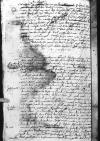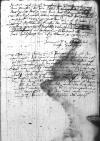 AAWO, AB, D. 7, f. 81v
AAWO, AB, D. 7, f. 81v
Durchlauchter, hochgeborner furst, hochgunstiger, liber her und freundt. Unser freuntliche, willige dienst zuvoran(n). /
... illegible⌈...... illegible⌉ Wie uns vorlengst Ew(e)r f(urstlichen) Lieb ⌊⌋ mit den supplicacion von den hern superinscribed in place of crossed-out ...⌈... illegible⌈...... illegible⌉ h(e)rn hern superinscribed in place of crossed-out ...⌉ rector, doctorn und magistris... on the margin⌈rector, doctorn und magistris... illegible⌈...... illegible⌉rector, doctorn und magistris... on the margin⌉ und ⌊radts zu ⌊Leipczig⌋⌋ zu komen(n), / hab wir daraus superinscribed⌈darausdaraus superinscribed⌉ vormerckt, / das gedochte supplicanten E(wer) f(urstlichen) L(ieb) willen(n), / uns den freitag noch Letare[1] im jar MD XXXIII zugeschriben(n), / nicht gedencken noch zu komen(n) und solchs gelt des testaments doctoris selig ⌊Cuppenerii⌋ bey sich zu halten(n), / do von nicht noch laut des testaments, / sonder noch irem gefallen(n) solch gelt on the margin⌈solch geltsolch gelt on the margin⌉ den studenten / hie aus dissem lande, / jungfern(n) und prister auszuteilen(n). / Wie billich das ist, / gebe wir E(wer) f(urstlichen) L(ieb) hochem vorstande zu erkennen(n), / wir hetten ouch gehofft, / sie solten guttem cristlichem superinscribed⌈cristlichemcristlichem superinscribed⌉ gewissen noch / sich vordan habn(n) erczegt, / und derwegen so still gestanden(n). / Dieweil sicher hidden by binding⌈[r]r hidden by binding⌉ aber mitler zceit on the margin⌈mitler zceitmitler zceit on the margin⌉ aus gotlicher schickung ist zugetrugen(n), / das wie aus dem ⌊Culmischen bischtum⌋ / ⌊hie her⌋ transferirt hidden by binding⌈[t]t hidden by binding⌉ und geseczt sein / und der hochwirdige in Got, unser freuntlicher, liber bruder, her ⌊Tideman(n)us⌋ in unser vorige bischtum succedirt, / bitt wir neben seiner liebd, die derhalbn(n) ouch an E(wre) f(urstliche) L(ieb) thut schreiben(n), / wolde ein cristlich und gunstigs superinscribed in place of crossed-out ...⌈... illegible⌈...... illegible⌉ gunstigs gunstigs superinscribed in place of crossed-out ...⌉ in gedochts seliges ⌊doctoris hidden by binding⌈[is]is hidden by binding⌉ Cuppenerii⌋ testament ein sehen(n) haben(n), do mit on the margin⌈do mitdo mit on the margin⌉ die collegiatn(n) und die jenigen, die superinscribed⌈diedie superinscribed⌉ das zcinsgelt zcalen(n), darzu halten(n) wurden on the margin⌈wurdenwurden on the margin⌉, das gedochtem testament / und dem gelde, das den stu AAWO, AB, D. 7, f. 81r (t.p.)denten / und armen(n) jungfern hie zu vorheuraten, / ouch dem priester, der zur ⌊Lobau⌋ do von gehaltn(n) sol werd(en), / das jenige, das in noch laut des testaments zu kumpt, volkomlich werde geben(n), / ausgericht, / und hie ins landt geschickt, / wie wir uns dan zu E(wer) f(urstlichen) L(ieb), / wie zu einem(m) hochlibenden furstn(n), der gerechtigheit genczlich wollen vorsehen(n), / derselbtn(n) vunschende in gotlicher gnadenn superinscribed in place of crossed-out von Got dem almechtigen⌈von Got dem almechtigen in gotlicher gnaden(n) in gotlicher gnadenn superinscribed in place of crossed-out von Got dem almechtigen⌉ ein lang, gesunt leben(n) und alle seligheit.
AAWO, AB, D. 7, f. 81r (t.p.)denten / und armen(n) jungfern hie zu vorheuraten, / ouch dem priester, der zur ⌊Lobau⌋ do von gehaltn(n) sol werd(en), / das jenige, das in noch laut des testaments zu kumpt, volkomlich werde geben(n), / ausgericht, / und hie ins landt geschickt, / wie wir uns dan zu E(wer) f(urstlichen) L(ieb), / wie zu einem(m) hochlibenden furstn(n), der gerechtigheit genczlich wollen vorsehen(n), / derselbtn(n) vunschende in gotlicher gnadenn superinscribed in place of crossed-out von Got dem almechtigen⌈von Got dem almechtigen in gotlicher gnaden(n) in gotlicher gnadenn superinscribed in place of crossed-out von Got dem almechtigen⌉ ein lang, gesunt leben(n) und alle seligheit.
 AAWO, AB, D. 7, f. 81r (t.p.)denten / und armen(n) jungfern hie zu vorheuraten, / ouch dem priester, der zur
AAWO, AB, D. 7, f. 81r (t.p.)denten / und armen(n) jungfern hie zu vorheuraten, / ouch dem priester, der zur 
